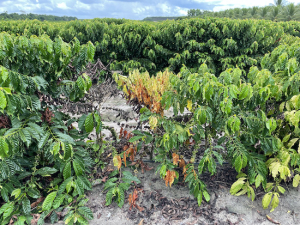 Prelecionista: Marina Faria Bracale
Prelecionista: Marina Faria Bracale
Orientador: Robert Weingart Barreto
Data: Terça, 19/03/2024, às 16h
Local: Anfiteatro do ESB
Resumo: Most diseases occurring on coffee in Brazil have been well investigated and their etiology have been fully clarified. A notable exception is that of an emerging disease that is now affecting large areas planted with Coffea canephora (conilon) in the states of Espírito Santo (ES) and Bahia (BA), Brazil. Losses of large stands of adult productive plants are common. Since this disease first appeared in the early 2010s, the search for a pathogen behind it was initiated. The results of the few published studies on the matter are somewhat controversial and even the choice of a common name for the disease was pending, until recently. It has been named “cancro dos ramos do cafeeiro – (Coffea canephora)” or stem canker-disease of conilon (SCC). What was once thought to be just a localized minor problem for conilon plantations became a widespread problem for this crop in ES and BA. This is regarded as the worst threat to the conilon plantations in ES and BA, a crop of major relevance for the economy of both states and Brazil too – the second world producer of conilon coffee, behind Vietnam. In the present study, a detailed description of the SCC is provided, along with results from a metagenomic study aimed at providing an alternative approach to pinpointing an unidentified and elusive pathogen behind SCC.
